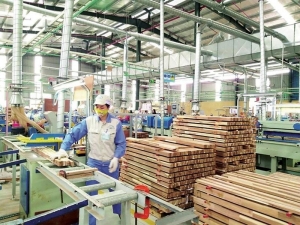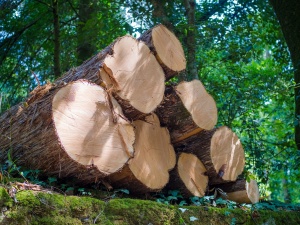Large-scale timber forest development remains challenging for Vietnam

Speaking at the Forest Products Round Table on November 2, Dr. To Xuan Phuc, senior advisor at Forest Trends, stated that although Vietnam has 3.5 million hectares of domestically grown forests, just 20 per cent of that area is used in the processing of wooden products for export.
According to Phuc, the absence of legal documentation regarding the land and the transactions renders ascertaining the legitimacy of timber established in such areas exceedingly challenging, if not impossible in some cases.
"As reported by several enterprises that are presently engaging in partnerships with households to establish timber plantations and harvest substantial quantities, ownership rights have been granted to a mere 40 per cent of the affiliated households. The remaining 60 per cent have not been granted such rights. The lack of these documents means that there is no legal proof to show that the household is the legal owner of the forest land," Phuc pointed out.
An increasing number of investors are showing interest in the substantial timber supply originating from Vietnam, particularly in light of the requirement that wood and forestry products disclose the origin of their raw materials before entering the global market.
Timber regulations are in place in Japan and South Korea, in addition to the US' Lacey Act, Europe's Forest Law Enforcement, Governance, and Trade, and the Regulation on Deforestation-Free Products, which Vietnam's primary import markets are implementing to progressively enforce stricter regulations on imported wood and wooden products.
Two Japanese corporations, Tokyo Sangyo and Daichu Corporation, collaborated with the provincial leaders of Binh Dinh at the end of October to rent 15,000ha of forest to establish vast timber plantations that would provide raw materials for a wood pellet factory with an annual capacity of 160,000 tonnes.
Woodsland Furniture, located in the northern province of Tuyen Quang, has engaged in collaborative investments with five forestry companies since 2015 to procure cultivated wood products that are eligible for Forest Management certification from the Forest Stewardship Council (FSC/FM). The area under the company's management has now been expanded to more than 28,000ha.
According to Woodsland's president Do Thi Bach Tuyet, the company requires between 150,000 and 200,000 cubic metres of round wood annually, of which more than 90 per cent is FSC/FM-certified and unprocessed. Woodsland, a company that manufactures exterior and interior timber products for IKEA, exports to the EU, the US, and Japan.
"Developing a large raw material area is Woodsland's strategic long-term goal," said Tuyet.
Presently, for a minimum of seven years, the organisation, its collaborators, and afforestation households employ sustainable forest management techniques to systematically establish expansive growing areas.
Over the 2023-2025 period, Song Kon Forestry Ltd. intends to re-establish a substantial forest encompassing an approximate area of 287ha. However, Nguyen Ngoc Dao, president of Song Kon, remains apprehensive about the financial burden associated with the establishment of such large areas, which exceeds $2,900 per ha on average.
Commercial bank loan interest rates and a shortage of tree varieties are significant obstacles that impede the progress of Song Kon, a state-owned enterprise situated in Binh Dinh province. This People's Committee has approved a loan of over $440,000 for the planting of forests by Song Kon between 2023 and 2025.
The average cost of planted forest timber, according to Song Kon, is $50 per tonne, or approximately $3,000 per ha. The productivity of three-year-old forests is modest, at approximately 60 tonnes per ha. The yield reaches 180 tonnes per ha after eight years, which satisfies the processing requirements.
As stated by Dao, "The exploitation cycle of sizable timber plantations typically spans a duration of 8-10 years. Additionally, forest producers require a substantial amount of capital to finance forest investments and other associated expenses."
Do Xuan Lap, chairman of the Vietnam Timber and Forest Products Association (VIFORES) said, "The timber industry continues to face the challenge of gradually reducing wood imports, which have reached 6 million cu.m annually, by proactively searching for input sources."
Vietnam spent close to $2 billion on the import of timber products in 2022. According to VIFORES, the nation primarily imports unprocessed timber from North America and Europe at this time.
As a result of the supply disruption caused by the conflict between Russia and Ukraine, which drove up the cost of raw materials in Europe, businesses are now obligated to persuade clients to substitute imported wood with domestically harvested alternatives, primarily tram wood.
However, Lap stated, "This is only a short-term remedy. Developing large timber forests necessitates policies that encourage afforestation households and businesses to expand planting areas and restrict the export of unprocessed materials, sawn wood, and peeled wood products in favour of processed goods with higher added value."
Furthermore, Lap argues that there is a need for more robust partnerships between businesses and domestic forest-planting households. This is essential so that farmers can maintain the trees for an extended period of time, thereby supplying the processing industry with the unprocessed wood it needs.
 | Vietnam receives $41 million from World Bank for sale of forest carbon credits Vietnam has received over $41 million from World Bank for sale of forest carbon credits, equal to 80 per cent of the committed amount under the Emission Reductions Payment Agreement. |
 | Wood and timber sector anticipating strong finish to year Wood and timber firms have reported an uptake in orders and are taking measures to increase exports in the build up to vibrant year-end shopping season. |
 | Two Japanese firms pledge $60 million investment in forestry sector Two Japanese companies, Tokyo Sangyo and Daichu Corporation, have committed to a substantial investment of approximately $60 million in the Vietnamese central province of Binh Dinh, intending to develop a significant forestry and biomass production project. |
What the stars mean:
★ Poor ★ ★ Promising ★★★ Good ★★★★ Very good ★★★★★ Exceptional
Related Contents
Latest News
More News
- SK Innovation-led consortium wins $2.3 billion LNG project in Nghe An (February 25, 2026 | 07:56)
- THACO opens $70 million manufacturing complex in Danang (February 25, 2026 | 07:54)
- Phu Quoc International Airport expansion approved to meet rising demand (February 24, 2026 | 10:00)
- Bac Giang International Logistics Centre faces land clearance barrier (February 24, 2026 | 08:00)
- Bright prospects abound in European investment (February 19, 2026 | 20:27)
- Internal strengths attest to commitment to progress (February 19, 2026 | 20:13)
- Vietnam, New Zealand seek level-up in ties (February 19, 2026 | 18:06)
- Untapped potential in relations with Indonesia (February 19, 2026 | 17:56)
- German strengths match Vietnamese aspirations (February 19, 2026 | 17:40)
- Kim Long Motor and AOJ Suzhou enter strategic partnership (February 16, 2026 | 13:27)

 Tag:
Tag:




















 Mobile Version
Mobile Version